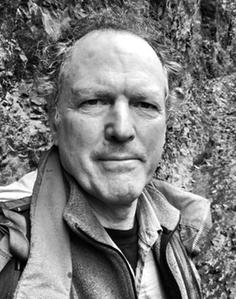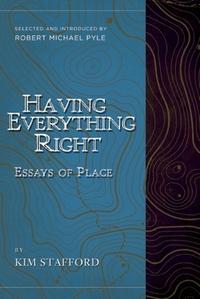
|
|
| photo: Perrin Kerns | |
Kim Stafford is the author of a dozen books of poetry and prose and has taught since 1979 at Lewis & Clark College in Portland, Ore., where he is the founding director of the Northwest Writing Institute. He holds a Ph.D. in medieval literature from the University of Oregon and has worked as an oral historian, letterpress printer, editor, photographer, and visiting writer at a host of colleges and schools in the U.S., Italy, Scotland and Bhutan. He is the son of poet William Stafford. His book Having Everything Right: Essays of Place won a citation for excellence from the Western States Book Awards in 1986. It has just been reissued by Pharos Editions, an imprint of Counterpoint Press dedicated to bringing to light out-of-print, lost and rare books of distinction, with a new essay by Stafford and a new introduction by Robert Michael Pyle.
Where did this book come from?
I was a wild child in those days. I didn't walk--I ran everywhere. Hunger was my food, confusion my wine. I was so thrifty I slit open envelopes, turned them inside out, and sewed them shut for mailing on a treadle sewing machine. I carried a wooden box over my shoulder filled with letters I had received and was writing--my personal, portable writing school. I had a mania for scrounging--scraping concrete from form-lumber to build my furniture, seizing discarded books from the library bin out back, haunting neglected orchards, gleaning wheat flattened at the edges of fields after the harvest. I lived essentially on muffins of hand-milled flour so dense my father called them "sinkers."
And I fed these obsessions, hungers, and my famished soul by wandering and writing--first long letters, then letters so long they became essays, and finally the manuscript for this book. When I found an editor in James Hepworth at Confluence Press in Idaho, and he embraced my ravings, I had a path for life.
What's changed about your Northwest since you wrote these pieces? What hasn't? Which has surprised you more?
The busy places have become busier. Cities are bigger, traffic can be a nightmare, the urban skyline gets taller, and in trendy neighborhoods the old houses get smashed and mansions sprout. You can hardly get through Seattle during rush hour, and Portland isn't much better.
But in the back country, at least some places are getting emptier, quieter. They revert to their primordial character, and remain deeply worthy of a ramble. But the people there struggle. The urban-rural divide becomes ever more intensely polarized, with the liberal urban population turning its back on increasingly conservative rural citizens. I miss a more unified feel, and hope the honoring of traditions in this book may witness for convergence. A lot of your observations and musings stem from your wanderings through the wild landscape of Oregon--clambering up and down canyons in a single sentence like John Muir, making light work of vast spaces. How important is intimacy with a place, and how feasible?
A lot of your observations and musings stem from your wanderings through the wild landscape of Oregon--clambering up and down canyons in a single sentence like John Muir, making light work of vast spaces. How important is intimacy with a place, and how feasible?
I was young and hungry. I felt a tug to get off road, off trail, into darkness and mystery. If the moon was full, there was no question of sleep--I had to be out in it. If I heard a hint of strong story, I had to go seek it. I resonated with my own notion of the Native American rite of passage some called a spirit quest--go forth with hunger and fatigue, and see if something in the landscape takes pity on you and offers a vision.
As I grow older, it seems the mysteries are everywhere--enigmas in the paper, bizarre behavior by individuals and nations, and I tend to do my seeking on the page rather than on the ridge before dawn. I think there are many ways to become intimate with a place, and taking a feverish tramp under difficult conditions is not the only one. At least for me.
There's an odd tone to many of your essays--quizzical yet knowing--and it's serviced by observations and snippets of dialogue that end on an elliptical note. Is this an effect you were consciously aiming for? If an essayist is someone who ventures and weighs, how important is interpretation? How important is conclusion?
Now when I read Having Everything Right, I'm struck by the confidence of this young writer. He really trusts the material to tell its own story. The resonant detail is set up, often, to offer a chance for investigation by a reader, as the narrator steps away.
In a book I wrote more recently, my editor complained that I explained too much. "Kim," she said, "you like to go with a reader up the rising action of an episode, over the top, and down the other side, as you explain what that episode meant. It might work better if you started up the incline with the reader, then let them find the epiphany on their own. Set them up, then let them find the meaning."
I thought this was very good advice, and I see I had an instinct for this approach with Having Everything Right. In a way, this approach is in keeping with what Barry Lopez reports Native people say of a teacher: "Someone present where learning is happening."
Looking back at your essays of 30 years ago, what do you enjoy most about them?
I enjoy watching this wanderer, vagabond, seeker, wild dreaming rover surrender to temptations in all direction, to questions, stories, places, sensations, even hurts and struggles. He's simply all in. He hasn't learned to calculate what's comfortable, survivable, sensible. He has what I now call "tropism toward the difficult."
And what a rollicking style! My father, the great poet of Midwestern plain speech, called my writing "Baroque prose."
In your new essay, "Root Feast," you're with your daughter at a warm, generous celebration in a long house, and you spend time asking about ways to contribute, to make a donation. And you are told repeatedly, "You will find a way." Do you think this collection is your contribution? And if so, how well, in hindsight, do you feel you've succeeded?
I feel I've been trying to "find a way" to contribute to the treasures of fragile, beautiful places and cultural traditions all my life. Writing this book was one way. Founding the Northwest Writing Institute in 1986, the year this book came out, was another. Founding the Oregon Folk Arts program in 1988 was another. Co-founding the Fishtrap Writers Gathering in northeast Oregon in 1989 was another. Working with the Sitka Center for Art & Ecology, taking writers to Italy, Scotland, and Bhutan, publishing books about trees, family, and the creative life, and teaching spiritual liberation through the practice of writing are all forms of my trying to find a way.
What are you working on now?
I'm on fire to develop ways the lyric urge can be widely available to young people through digital means--on the verge of an invention there. And I'm finishing a book called Writing for Happiness: Seeker, Artist, Witness. The title refers not to happiness as the absence of strife, but how to find a way through the practice of writing to come into synch with "happ," what happens--the Dao. To face our fears and struggles by making song. --Zak Nelson, writer and bookseller

